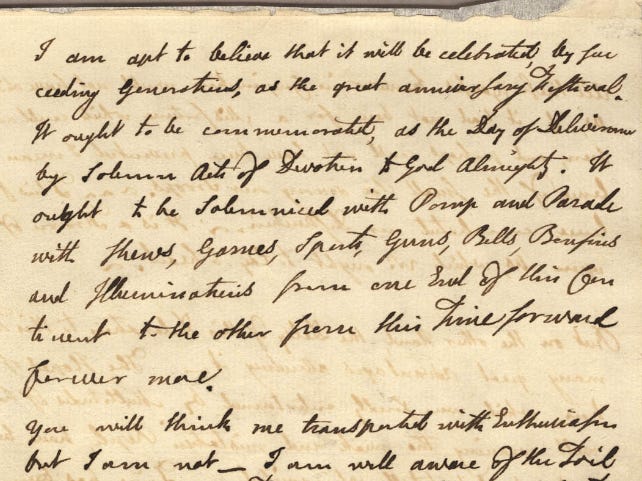"Bonfires and Illuminations from one End of this Continent to the other...."
John Adams to Abigail Adams, July 3rd, 1776
[Dear Readers: in honor of Independence Day, I’m publishing a portion of John Adams’ famous letter to Abigail Adams on the momentous events taking place in Philadelphia and beyond during the summer of 1776. Adams was one of the chief voices in favor of independence in the Continental Congress, and was widely acknowledged as the most skilled and forceful proponent of independence during Congressional debates on the resolution.
This letter to Abigail Adams, written on the 3rd of July, came the day after Richard Henry Lee of Virginia’s Resolution in favor of independence was approved by Congress on the 2nd. The consideration, with some revisions, of the Declaration of Independence — which itself began as an original draft by Thomas Jefferson, with revisions by John Adams and Benjamin Franklin — took place on the 3rd and the first part of the 4th, after which it was adopted by Congress.1
Adams, writing on the 3rd, dated Independence from the adoption of the resolution on the 2nd, though we today, of course, celebrate the entire process of declaring independence on the 4th (in 1776, the process ultimately continued into August.)2
It’s also important to note that the approval of the Declaration was what, in another context, the Duke of Wellington called “a near-run thing” — Adams, a keen observer of public opinion, estimated that American opinion was about 1/3 Patriot, 1/3 Loyalist or Tory, and 1/3 neutral. Jefferson, for his part, remarked in a letter to his former Professor at William and Mary, William Small, that a bill put forward by America’s great friend in Parliament, William Pitt (known to history as Pitt the Elder, and created the 1st Earl of Chatham in 1766, after his successful service as Prime Minister during the Seven Years War), if it had passed, might have brought reconciliation between Britain and the Colonies; but the House of Lords defeated the bill in February of 1775, by a vote of 61-32, and the two disputing parties moved closer to total separation.3
Adams begins his letter with a discussion of how he wished independence had been declared earlier, and how such an action by Congress might have aided America’s invasion of Quebec and the country’s diplomatic standing among foreign powers. Nevertheless, he still saw advantages from delaying the Declaration to the summer:]
(A portion of John Adams’ letter to Abigail Adams; credit — The Massachusetts Historical Society. See Footnote 4 for the citation.)
“But on the other Hand, the Delay of this Declaration to this Time, has many great Advantages attending it. -- The Hopes of Reconciliation, which were fondly entertained by Multitudes of honest and well meaning tho weak and mistaken People, have been gradually and at last totally extinguished. -- Time has been given for the whole People, maturely to consider the great Question of Independence and to ripen their judgments, dissipate their Fears, and allure their Hopes, by discussing it in News Papers and Pamphletts, by debating it, in Assemblies, Conventions, Committees of Safety and Inspection, in Town and County Meetings, as well as in private Conversations, so that the whole People in every Colony of the 13, have now adopted it, as their own Act. -- This will cement the Union, and avoid those Heats and perhaps Convulsions which might have been occasioned, by such a Declaration Six Months ago.
But the Day is past. The Second Day of July 1776, will be the most memorable Epocha, in the History of America.
I am apt to believe that it will be celebrated, by succeeding Generations, as the great anniversary Festival. It ought to be commemorated, as the Day of Deliverance by solemn Acts of Devotion to God Almighty. It ought to be solemnized with Pomp and Parade, with Shews, Games, Sports, Guns, Bells, Bonfires and Illuminations from one End of this Continent to the other from this Time forward forever more.
You will think me transported with Enthusiasm but I am not. -- I am well aware of the Toil and Blood and Treasure, that it will cost Us to maintain this Declaration, and support and defend these States. -- Yet through all the Gloom I can see the Rays of ravishing Light and Glory. I can see that the End is more than worth all the Means. And that Posterity will tryumph in that Days Transaction, even altho We should rue it, which I trust in God We shall not.”4
[Thank you for reading, and I wish you all a very happy and safe Fourth of July! — Ben Cronin.]
See the National Archives for the legislative history of the Declaration. https://www.archives.gov/founding-docs/declaration-history.
Ibid.
See Thomas Jefferson to William Small, May 2nd, 1775, https://avalon.law.yale.edu/18th_century/let6.asp; for Lord Chatham’s bill, formally entitled “A provisional act, for settling the troubles in America, and for asserting the supreme legislative authority and superintending power of Great-Britain over the colonies,” see https://quod.lib.umich.edu/e/evans/N11109.0001.001/1:3?rgn=div1;view=fulltext; on the Lord Chatham’s bill, and Franklin’s efforts towards reconciliation, see https://allthingsliberty.com/2018/01/franklins-secret-efforts-bring-reconciliation/; as well as https://founders.archives.gov/documents/Franklin/01-21-02-0251.
John Adams to Abigail Adams, Philadelphia, July 3rd, 1776, via the Massachusetts Historical Society: https://www.masshist.org/digitaladams/archive/doc?id=L17760703jasecond#:~:text=It%20ought%20to%20be%20solemnized,Enthusiasm%20but%20I%20am%20not.





Fantastic homage Ben! Thank you! Happy Fourth brother.
Well done, Dr. Ben! Important to reflect on our ‘birth pains’ in 1776 in today’s world of 2024! Not enough people know our history nor what we celebrate on the 4th of July ! As Ben Franklin answered the question:
“What have we got? A republic or a monarchy ?” -“A republic, if you can keep it", he replied . 🇺🇸🇺🇸🇺🇸